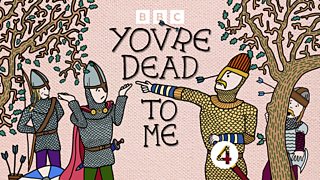David Bowie: Evil Fascism Flirter or Genius Musical Chameleon?
Each week on Evil Genius with Russell Kane, someone substantial from the annals of history has their reputation reanalysed by a panel of comedians who then decide whether they should be heralded or heckled.
This one is a biggie. David Bowie is one of the most beloved musical figures ever to exist. But does he have enough unpleasant skeletons in his closet to get viciously cancelled? Kerry Godliman, Esther Manito and Rhys James join Russell to investigate the life of this lauded Laughing Gnome and decide if he was a Thin White Duke or pile of puke.
Here's what they found…

For: he was David Bowie
One of the most important, innovative and critically acclaimed musical artists of all time, David Bowie is a pure rock icon, though success wasn’t immediate. It wasn’t until his fifth album in 1972, The Rise and Fall of Ziggy Stardust and the Spiders from Mars, that Bowie achieved the recognition he had craved. Once established, the acclaim continued with a slew of influential albums in the 1970s and mainstream chart-toppers in the 80s, all the way through to his final album Blackstar released just before his death in 2016.

Against: he flirted with fascism
In an interview with Playboy magazine in the 1970s, Bowie claimed ‘Adolf Hitler was one of the first rock stars’, followed by other comments concerning fascism. There were also reports that he was interested in Nazi memorabilia, that his mother was an Oswald Mosley supporter and that Bowie once gave fans a Nazi salute. Bowie always denied giving the salute, had a fraught relationship with his family and apologised for his Playboy comments. But his remarks at the time were taken so seriously that they, in part, led to the formation of the Rock Against Racism movement. Russell asks a pertinent question: “At what point do we say, ‘we don’t care how good the art was, that’s problematic’?”
For: he was a gay icon
One of the most unforgettable moments in TV music history took place on July 6th 1972, when Bowie performed his hit Starman on Top of the Pops. Wearing a tight fitting multicoloured jumpsuit, painted nails and with his arm slung around guitarist Mick Ronson, Bowie appeared androgynous and other-worldly and shocked viewers. This appearance took place before London’s first gay pride march and only five years after homosexuality for men had been decriminalised. A few months before the performance Bowie had stated in a music press interview that he was gay. The singer Tom Robinson described Bowie’s influence on gay artists like himself as ‘seismic’. As Russell points out: “It’s hard to overstate how ahead of the curve he was”.
Against: he rejected his gay status
Though there are reports that Bowie did have at least one same-sex relationship as a younger man, many felt that his flirtation with homosexuality was purely a ruse to sell records and appear transgressive. 11 years after he declared himself bisexual, Bowie said it was ‘the biggest mistake I ever made’. He had a child with his first wife Angie and later married the model Iman. While he still inspired a generation of young gay people, some still felt let down that he appeared to adopt a gay image just for publicity. As Kerry says: “That’s a side of him I’m a little uncomfortable with.”

For: he was humble
He was always the boy from Bromley at heart. Though he adopted many on-stage personas, off-stage he was often straightforward and relatable. One story Bowie told was about meeting an old man on a beach during the filming of the Ashes to Ashes video. Bowie was dressed as a Pierrot and when the man was asked if he knew who Bowie was, he replied ‘he’s some c*** in a clown suit’. No one could accuse Bowie of taking himself too seriously.
Against: he (allegedly) slept with an underage girl
Lori Mattix claimed in an interview that she lost her virginity to Bowie when she was just 14. Mattix has since stated that she didn’t regret the encounter, but has also said that her perspective on the incident (and the whole groupie scene) has changed as she’s grown older. Bowie himself never commented on Mattix’s story and there is conflicting evidence regarding the timeline of the encounter from others and from other stories that Mattix has told. Even with all the disputed evidence, as Russell says: “we’re in uncomfortable waters here.”
So what did the panel decide? Was Bowie an unrivalled source of inspiration or a Nazi-loving creep? You’ll have to listen to Evil Genius to find out.
More from 成人论坛 Radio 4
-
![]()
Evil Genius: Marvin Gaye
Maisie Adam, Ania Magliano and Marlon Davis wonder what was goin' on with the soul singer.
-
![]()
Evil Genius: Johnny Cash
Thanyia Moore, Pierre Novellie & Lauren Pattison ask if the country star did walk the line.
-
![]()
Your Place or Mine with Shaun Keaveny
Shaun Keaveny presents the travel podcast that isn't going anywhere.
-
![]()
You're Dead To Me
Greg Jenner presents the comedy podcast that takes history seriously.




